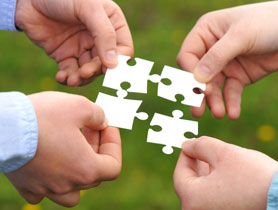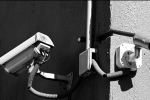August 12, 2014
Giving in Community
 If I didn’t know better, I’d admire the marks on his calf. Tattoo-like, they resemble a heliocentric solar system, small black planets circling a sun spot in the middle.
If I didn’t know better, I’d admire the marks on his calf. Tattoo-like, they resemble a heliocentric solar system, small black planets circling a sun spot in the middle.
But I know this isn’t a mid-life form of self-expression but marks to guide radiation. And I know his wife is deeply grateful because after months of job searching, she was hired at the last minute as a grade-school teacher. For now, at least, the family has a break from the gut punches.
There’s the couple celebrating their anniversary, and the kids in the trees, imagining games beyond the comprehension of adult minds. Around the lunch table, three generations gather, but they’re missing the fourth, the infant that new mom and dad didn’t think was quite ready for cabins and camping.
Two years ago, I didn’t know their stories. To be fair, they didn’t know mine either. But I spent a lot of time feeling sorry for myself, feeling isolated and outside the circle. I still had a lot to learn about community.
I’m just back from our parish weekend retreat, sore from bunk bed sleeping and fighting an allergy headache from three days in the woods with new pollens. But my heart is full. I feel like a part of something bigger than me, bigger than my family.
I’m part of a community.
In some ways, this discovery seems obvious. I go to church. I attend social gatherings. My husband is the priest. Of course, I’m part of the community. But it’s not so easy as that. Living in a community is different than being in community. It requires more, a give and take, a sharing of stories, some self-sacrifice and awkward moments, some joy and heartache.
It’s easy to blame others when you feel on the outside. And sometimes that’s true. In a congregational setting, people can be clique-ish. Unfriendly. Superficial. But they also can be shy or intimidated. Oblivious or focused.
I’ve known for a long time that community requires an invitation in. And congregational leaders and formation resources spend a lot of time offering advice and tips to people about how to be welcoming and how to engage newcomers.
But I’m learning that being in community also requires an individual response. I must be willing to personally risk and share, to extend grace and to put aside preconceived notions.
Sometimes, when I was feeling alone and excluded, I would blame others for not inviting me in. In some instances, I wasn’t ready yet to claim my own responsibility, and to recognize that being in community requires more give than take.





